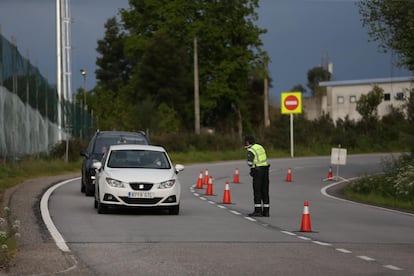Getting around Spain’s lockdown rules: the motorcyclist who traveled 21km to buy bread
Civil Guard officers have heard all sort of excuses from people for breaking the coronavirus confinement, and have fined 3,695 drivers for traveling to their second homes


Sergeant Lorenzo, who works in the Civil Guard’s traffic department in Spain’s northwestern Galicia region, has heard every kind of excuse since the Spanish government implemented a state of alarm on March 15 and put the country on lockdown in a bid to slow the spread of the coronavirus.
At the police checkpoints near the entry and exit points to towns – checks are being mostly conducted in municipalities with more Covid-19 infections – the most common excuse heard from drivers is “I am going to get bread,” or “I am going to buy groceries.” But these claims rarely work. Last weekend, of the 7,096 security checks on roads, 3,695 were secret trips to second homes, according to data provided on Monday by Civil Guard official José Manuel Santiago.
According to Santiago, thanks to the work of the nearly 14,000 Civil Guard officers who were patrolling Spain’s cities and towns on Sunday, 62,056 people were identified and 2,101 cars intercepted. In total, the Civil Guard issued 4,620 reports for breaking the lockdown rules – 7.4% of those identified – and arrested 21 people for resisting authority and disobedience. The National Police also made 63 arrests (823 have been made since the state of alarm was implemented) and filed 4,810 reports for disobedience, bringing the total to 66,990.
A middle-aged couple said that they were on their way to the video rental store to get a film
Despite the insistence from Spanish authorities that people must remain in their homes to avoid transmission, there continue to be individuals, “albeit the minority,” who act uncivilly, and, in some cases, have been sent to prison for not respecting the extraordinary measures. “It’s been quite a few days [since the lockdown came into effect] and people are starting to get bored at home,” explains Lorenzo.
Indeed, people in Spain have come up with many ways to try to fool the Civil Guard into believing they are respecting the rules of the lockdown. Here are some of the excuses Sergeant Lorenzo heard this weekend as he patrolled the roads.
“This is not your home”
When a 78-year-old cyclist with a “helmet, gloves, backpack and light” was asked where he was heading, he replied that he lived 100 meters away. The officers accompanied him to his home, which was “the furthest house in the nearest village to where he was intercepted.” When they arrived, they found a woman who told the officers: “I have been in this house for 60 years and I have never seen that man in my life.”
The cyclist, caught out lying, had brought the officers to a house that wasn’t his. “It appears this is not your home,” the officers told him. Indeed, as it was later proven, the 78-year-old lived more than 10 kilometers away and confessed that he had left to go on his normal bike route because he couldn’t stand being at home any longer. The decision, which has been reported, could cost him between €300 and €30,000, according to an estimate from the central government’s delegate in A Coruña, which is the authority in these matters.
“Delivering newspapers”
“On Sunday at around 9am, a Civil Guard vehicle patrolling the streets detected three people in a vehicle that tried to avoid the patrol car.” There were three youths in the vehicle, a young woman and two young men – a violation of the lockdown rules which state that only one person is allowed in a car, except in some circumstances. Asked where they were going, they replied to “deliver newspapers.” But according to Lorenzo, they had nothing to prove that this was the case. “God knows where they had been,” he says, explaining that in most cases (95% or more), people are aware that they are breaking the stay-at-home orders. “At this point, everyone knows, there is nothing left to explain,” he says. In this instance, the young people “were accompanied to their corresponding homes, in a nearby town, and fined.”
Trip to the video rental store
A middle-aged couple who were stopped on Saturday said that they were on their way to the video rental store in town to get a film to watch that evening at home. “They knew that they have to leave [their home] only one at a time, and that renting a movie does not count as a good reason to leave,” says Lorenzo. Both were fined.
Buying bread 21 kilometers from home
Last Sunday, a Civil Guard checkpoint in a mountainous area stopped a motorcyclist who said he was going “to buy bread.” When they asked for his identification, it turned out that the man lived 21 kilometers away from where he had been stopped, and had apparently not been able to buy bread in any of the five towns he passed through. At last he confessed: “I went out to buy bread and...” He was reported and escorted to his home.
The last pilgrim on the Camino de Santiago
“He was the only pilgrim that we have found, there is no one else on the route,” says Lorenzo, in reference to the popular Camino de Santiago (or Way of Saint James) pilgrimage route. The man in question was a 40-year-old with a bicycle. “He didn’t have anything on him, no baggage, no money, and he could barely speak Spanish.” The officers drove him to Lalín, the closest town, where local authorities have put him up in a shelter where he must remain until the end of the lockdown period. “He left France one day and the coronavirus [outbreak] caught him while he was on the road. He must be the last pilgrim since the pandemic broke out.”
A wanted criminal
On Sunday, officers arrested a middle-aged man who was wanted by the justice system. The man had gone out to buy something to eat when he was stopped by the Civil Guard. Once the officers identified him, they discovered he had a long criminal history and had spent much of his time in hiding. A judge has sent the man to prison.
English version by Melissa Kitson.
Tu suscripción se está usando en otro dispositivo
¿Quieres añadir otro usuario a tu suscripción?
Si continúas leyendo en este dispositivo, no se podrá leer en el otro.
FlechaTu suscripción se está usando en otro dispositivo y solo puedes acceder a EL PAÍS desde un dispositivo a la vez.
Si quieres compartir tu cuenta, cambia tu suscripción a la modalidad Premium, así podrás añadir otro usuario. Cada uno accederá con su propia cuenta de email, lo que os permitirá personalizar vuestra experiencia en EL PAÍS.
¿Tienes una suscripción de empresa? Accede aquí para contratar más cuentas.
En el caso de no saber quién está usando tu cuenta, te recomendamos cambiar tu contraseña aquí.
Si decides continuar compartiendo tu cuenta, este mensaje se mostrará en tu dispositivo y en el de la otra persona que está usando tu cuenta de forma indefinida, afectando a tu experiencia de lectura. Puedes consultar aquí los términos y condiciones de la suscripción digital.








































